|
|
|
Sort Order |
|
|
|
Items / Page
|
|
|
|
|
|
|
| Srl | Item |
| 1 |
ID:
131895
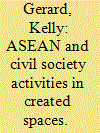

|
|
|
|
|
| Publication |
2014.
|
| Summary/Abstract |
The Association of Southeast Asian Nations (ASEAN) has recently made numerous commitments to engage civil society organizations (CSOs) in its governance practices. However, the opportunities created offer limited means for CSOs to contest policy as a result of strict controls over who can participate and the forms of participation permitted. Activists have consequently pursued their agendas outside of spaces sanctioned by ASEAN through 'created spaces,' such as conferences organized parallel to official summits. However, this form of political participation has limited potential to influence official processes because despite its independence, these activities are still structured in relation to ASEAN practices. The ineffectual nature of CSO advocacy despite ASEAN's people-orientated shift has been documented, however explanations for this trend remain limited. This article applies the modes of political participation framework that acknowledges the role of intergovernmental organizations in structuring spaces for civil society participation and, in doing so, shaping the contribution that CSOs can make. Through an examination of the regulations and practices that govern CSO participation in both ASEAN-sanctioned and independent spaces, it argues that spaces for CSO participation are structured to prevent CSOs from contesting policy, suggesting that ASEAN's shift to widen participation is directed towards legitimating its reform agenda. Hence, ASEAN's claim of becoming 'people oriented' must be considered in recognition of the limiting effect its engagement practices have on CSOs' ability to advance alternative agendas.
|
|
|
|
|
|
|
|
|
|
|
|
|
|
|
|
| 2 |
ID:
131882
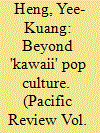

|
|
|
|
|
| Publication |
2014.
|
| Summary/Abstract |
Many studies of Japan's soft power are premised on the 'affective' dimensions of its kawaii pop culture that generate liking or interest. While entirely warranted, emphasising cultural attraction does not do sufficient justice to the multi-faceted foundations of Japanese soft power. Neither does it recognise other components of Joseph Nye's soft power framework stressing the 'normative' appeal of policies that reflect global norms. This article investigates the 'normative' dimensions of Japan's soft power on climate change, and whether it translates into international influence, as Nye predicted. The first section examines the Cabinet's 2010 New Growth Strategy, identifying a potential source of 'normative' soft power in its self-proclaimed desire to reinvent Japan as a 'trouble-shooting nation on global issues', specifically environmental challenges. Next, it analyses how Japanese entities (government, corporations, and NGOs) can transmit 'normative' soft power, and obstacles encountered. These transmission mechanisms include 'Cool Earth Partnership' programmes, the 'Future City Initiative' and the values-based Satoyama Initiative. The final section addresses conceptual implications that arise, and assesses whether Japan's 'normative' soft power has paid dividends. Drawing from literature on pioneer states and external reviews of Japan's alignment with key climate norms, the paper suggests that Japan's normative soft power is lacking in driving agendas at global climate forums. At a pragmatic problem-solving level, however, Japan is increasingly perceived as an attractive source of transferable solutions, reflecting climate norms such as developing eco-friendly technologies and providing assistance to help vulnerable countries mitigate climate change
|
|
|
|
|
|
|
|
|
|
|
|
|
|
|
|
| 3 |
ID:
131892
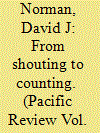

|
|
|
|
|
| Publication |
2014.
|
| Summary/Abstract |
This article explores the emergence of new spaces for civil society organisations (CSOs) as a result of an increasing interest by international donors in multi-stakeholder approaches to good governance under the 'new policy agenda'. Drawing upon a contemporary case study of civil society in Cambodia, it argues that CSOs have been encouraged to perform two key roles on a national level: professional service delivery agents and democratic watchdogs. Both roles are seen by donors as integral to supporting an accountable and professional model of the Cambodian state while drawing upon valuable private sector lessons in a synergetic model of governance. The result is the construction of particular neoliberal spaces for CSOs operating as technical implementation mechanisms in response to externally driven donor pressures. Furthermore, under this new framework of governance, CSOs face pressure to undergo internal transformation akin to new public management reform; embracing economistic and administrative modes of coordination as core values of civil society participation.
|
|
|
|
|
|
|
|
|
|
|
|
|
|
|
|
| 4 |
ID:
131888
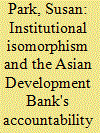

|
|
|
|
|
| Publication |
2014.
|
| Summary/Abstract |
In the 1990s Multilateral Development Banks created accountability mechanisms (AMs) that allowed people affected by development projects redress. Currently undertheorized, this paper examines how and why the Asian Development Bank (ADB) created an AM, and whether the AM serves its purpose to hold the ADB to account and to provide 'fair hearing of the views of the affected group'. This article argues that the ADB created a new AM because of institutional isomorphism, borrowing the idea of the AM from the World Bank as a result of coercive and mimetic isomorphic processes. Further, that the ADB introduced a mechanism ill-suited to the pre-existing (old) organizational culture of the ADB, which is based on consensus and hierarchical rule-following in the context of ADB operations to further economic growth while upholding state sovereignty. Despite its restructure and recent review, the mechanism's weakness was revealed through a stand-off between China and the AM over an investigation begun in 2009 (creating something 'blue'). The paper concludes that the AM's ability to serve its purpose will remain hampered as long as ADB maintains consensus around economic growth and state sovereignty over providing recourse to affected people.
|
|
|
|
|
|
|
|
|
|
|
|
|
|
|
|
| 5 |
ID:
131880
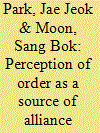

|
|
|
|
|
| Publication |
2014.
|
| Summary/Abstract |
The level of alliance cohesion is affected by the shift of attitudinal aspects (such as homogeneity in goals and threat perceptions) and behavioural aspects (such as strategic compatibility, command structure and defence burden-sharing) of alliance operation. In particular, a clear threat perception tends to make an alliance cohesive, as it suppresses (potential) disputes over the behavioural aspects of alliance operation. This article argues, however, that it is not sufficient to evaluate whether an alliance is cohesive or not only by looking at how these attitudinal and behavioural indicators have changed over time. If it were sufficient to do so, it would be supposed that the level of alliance cohesion would be bound to become lower with a change of government from conservative political forces to liberal ones in cases such as those of the US-ROK and the US-Japan alliances. We argue that the list of indicators for alliance cohesion should include not only attitudinal and behavioural aspects of alliance operation, but also functional aspects. While serving its primary purpose of responding to a specific threat, an alliance incurs an additional function of serving to maintain or to build a favourable regional order that is appreciated by both liberal and conservative governments. The interests in relation to order-building and order-maintenance motivate allies to invest for the alliance, often at their own political risk, even while they are engaged in contentious negotiations with the United States over attitudinal and behavioural aspects of alliance operations. Such investments can be considered as a different type of alliance burden sharing than has heretofore been given adequate attention. The investments indeed consolidate the alliance, paving the way for further upgrading of the alliance as conditions warrant.
|
|
|
|
|
|
|
|
|
|
|
|
|
|
|
|
| 6 |
ID:
131885


|
|
|
|
|
| Publication |
2014.
|
| Summary/Abstract |
This article explores why the Japanese government did not decisively intervene on behalf of bank bailouts at the early stage of the banking crisis of 1997-98 and investigates the institutional and political context behind the use of fiscal money for bank bailouts in 1997-98, 1998-99, and 2001-05. In contrast with prevailing views, which emphasize the conflicts of interest or differences in policy preferences between politicians and bureaucrats and their captured nature either by bankers' special interests or political/bureaucratic interests, this article argues that Japanese policymakers shared a congruent policy preference - that is, minimizing the disruptions in the existing institutional arrangement in government-bank-firm relations and this congruence in policy preference (or 'cognitive capture') compelled the government to take a creditor-centered approach to the banking problem - i.e., letting banks resolve their own problems. It also argues that a strong political leadership that can break with the 'cognitive capture' and sustain government's resolute commitment to solving the nonperforming loan problem is an essential factor for successful bank restructuring.
|
|
|
|
|
|
|
|
|
|
|
|
|
|
|
|
| 7 |
ID:
131897
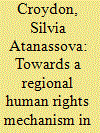

|
|
|
|
|
| Publication |
2014.
|
| Summary/Abstract |
Stretching a third of the way around the globe, the Asia Pacific is the world's most populous region. Yet, it remains the sole region without a human rights court or commission, and without a human rights treaty. The notable absence there of a human rights mechanism based on such institutions is often explained away by reference to the region's size and heterogeneity, the constituent states' reluctance to interfere in the affairs of others, and the existence of rivalries. Whilst agreeing that there is no inter-governmental initiative that looks set to change the present state of affairs in the Asia Pacific, this article places the spotlight on another model of creating a regional human rights mechanism, that is, the unique and burgeoning Asia Pacific Forum of National Human Rights Institutions. Specifically, it assesses the prospects for Japan, Taiwan and China - three key regional players whose membership of the Forum is still outstanding - to create domestic human rights bodies that eventually join.
|
|
|
|
|
|
|
|
|
|
|
|
|
|
|
|
|
|
|
|
|